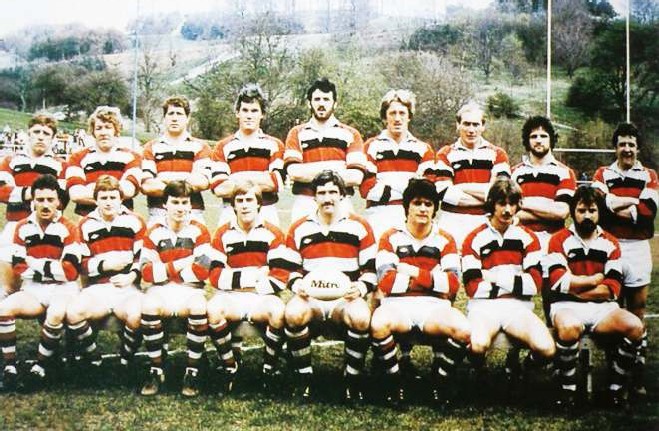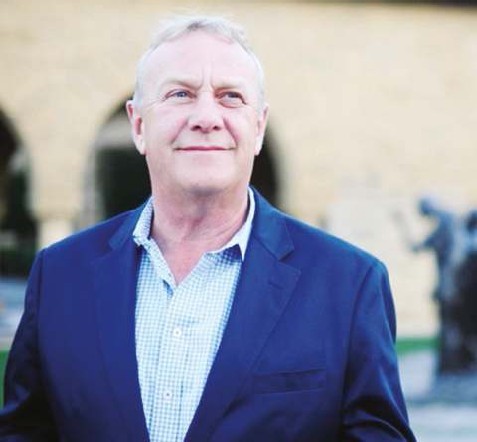Lyndon J Faulkner tells BRENDAN GALLAGHER about Ray Prosser's lasting impression


RAY PROSSER, the guru behind Pooler's mean machine, might have been a hard taskmaster but he was also –whether by design or just instinctively – the shrewdest of man-managers who forged a template for success that launched one businessman's stellar career.
Lyndon J Faulkner – one of the most successful CEOs in the USA, which means the world – puts much of his success down to the lessons he learned at the feet of Prosser on and off the field during Pooler's most successful period during the 80s.
The nephew of legendary prop Charlie, Lyndon Faulkner was a classy centre before injury struck in 1985 and was a stalwart member of the side in their season of all seasons in in 1983-84 when Pooler lost just two of their 50 games.
Forced to retire way too early, he turned his abundant energy to the world of business, a man for whom winning and coming first on the sports field was ingrained. He had known nothing else.
“I learned so much from Pross and it has guided me at times during my business career,” recalls Faulkner.
“How to treat people, how to communicate, how to relentlessly chase and plan for success and how to deal with rare defeats and setbacks “Contrary to legend Pross would only ever shout at you if he was right! He was actually a very fair considerate man and a father figure to a lot of the lads especially the Bish. He was definitely in charge – Pross was the boss no question – but he made the club feel like family. There's lesson number one for the budding CEO.
“He was also an incredible facilitator. He had this vision of how he wanted his team to play which he formed during his British and Irish Lions tour of New Zealand in 1959 and when he became Pooler coach he made that happen. In business you need that vision. What are we trying to do?”
After reluctantly hanging up his boots, Faulkner was the young man who convinced a sceptical music industry in Britain to switch from cassette to CD and DVD technology while in the late 1980s he floated Technicolor/ Nimbus on the NASDAQ before being head-hunted by Bill Gates and Microsoft.
At Microsoft his career went off the Richter scale overseeing the introduction of world leading brands Windows, Windows Vista, Microsoft Office and XBox. Yes he's the man to blame! More latterly he has become the CEO for Pelican Products in California.
Faulkner believes Prosser's real genius was talent identification and moulding disparate characters into one working unit. Part of that process was the deliberate bestowing of nicknames – some not entirely complimentary – to every player in the squad which was a great leveller with doctors, headmasters, quantity surveyors and young business tyros being treated exactly the same as steelworkers, miners and the unemployed.
“Pross was a brilliant recruiter, his scouting system was second to none. There would be a couple of us from Newport, a modern languages graduate from Cambridge University like Eddie Butler or a doctor like Peter Lewis, but the majority were local junior players who had caught his eye.
“He always trusted you to get on with the job, another big lesson. When it came to floating a NASDAQ company in the States I had no expertise whatsoever in that field and it was pretty scary. So I did a Pross.
Identify the talent you need, hire the right people, enthuse them with your vision and then just let them perform.
“Teamwork was everything at Pooler. Everybody on the same page working for the one pre-determined goal. Clear-cut concise communication, dedication to the cause and tenacity, a willingness to undertake the long haul.
That's all stuff I took from rugby and Pooler. We were amateurs but took great pride in our physical fitness –we were fitter than any other side in Britain –which gave us supreme self-confidence.
“When I had to retire I spent the first year afterwards trying to sell the idea of CDs to record companies, a totally alien role because I was an engineer by training.
“For a while it was difficult, banging my head against a brick wall, but I still carried that self-confidence from Pooler days into my new job. I still believed if I worked hard enough ‘victory' would come.
And victory did finally come when our CDs appeared on Tomorrow's World with Raymond Baxter. After that it took off.”
The biggest lesson of all in Faulkner's opinion was learning how to handle defeat.
Pooler didn't lose very often when he played so when they did there were inquests in every pub and household in the town as well as the team changing room. The setback was poured over and lessons learned because winning was why Pooler played rugby, losing was an aberration, an imposter.
“Debrief, analyse, re-set, be better and go again” concludes Faulkner. “My memory is that a defeat at Pooler always sparked off an explosion of energy and a stunning bounce back and return to top form. Which is how it should be in business as well”



























